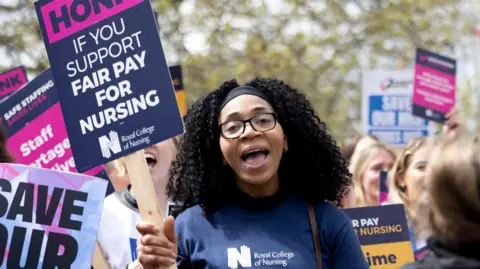In a critical development for healthcare in England, nurses are anticipated to “overwhelmingly” reject a proposed pay deal amid concerns about their compensation relative to other professions. This situation could lead to possible strikes as the Royal College of Nursing (RCN) gears up to announce the results of a consultative vote on the contentious 3.6% pay rise. The sentiment among nurses is one of dissatisfaction, especially as they believe it is unjust that their increase is lower than that offered to doctors, teachers, prison officers, and members of the armed forces.
The RCN’s upcoming announcement about the consultative vote results is met with keen interest, as it is rumored to reflect a significant rejection of the government’s pay offer. The government has pointed out that nurses received two above-inflation pay raises previously and are urging RCN members to accept the current proposal. Yet, the general sentiment within the nursing community suggests they feel undervalued and are unlikely to be appeased by the offers extended so far.
While the decision on embarking on formal strike action remains delayed until later in the year, the groundwork for potential labor unrest is unmistakable. Recently, the government endorsed the pay review body’s recommendation of a 3.6% salary increase for nurses this fiscal year. However, the participation rate in the consultative vote is inclined to surpass the critical 50% threshold necessary for any subsequent industrial action.
The RCN is keen on addressing broader issues concerning pay structures, rather than merely focusing on the headline percentage pay rise. A representative expressed the urgency of the situation by stating, “The results will be announced to our members later this week. As the largest section of the NHS workforce, nursing staff do not feel valued, and the government must urgently begin to rectify this.” Their demand for a negotiation session over the summer is directed to avoid a formal ballot for strikes in the fall.
In tandem with the nursing concerns, the Department of Health and Social Care has indicated that new full-time nurses will see their basic salary rise to £30,000 for the first time this year, influenced by recent increases. Nevertheless, the government maintains its position, asserting that they cannot negotiate further on top-line salary but are committed to discussing other significant issues including pay structuring, career advancement, and overall working conditions.
Adding to the unrest in the healthcare sector, the GMB union, representing thousands of health workers including ambulance crews, has similarly rejected the government’s pay offer, with a notable percentage voting against the 3.6% increase. Their national secretary, Rachel Harrison, detailed that they have reached out to Health Secretary Wes Streeting for an urgent discourse about pay and related matters, underscoring the urgency with which unions are approaching these discussions.
The discontent within the medical community further escalated as resident doctors in England, previously referred to as junior doctors, initiated a five-day strike following unsuccessful negotiations with the government regarding their remuneration. The health secretary has acknowledged that while it is impossible to entirely mitigate disruptions across the NHS, efforts are being made to keep them to a minimum.
This unfolding scenario highlights the delicate balancing act faced by the government and healthcare professionals in England as they grapple with pay disputes, labor actions, and an overarching quest for improved working conditions. The potential for strikes looms large as nursing staff and other health workers strive for acknowledgment of their contributions and fair compensation, while policymakers grapple with fiscal constraints and public service commitments. As these discussions evolve, the outcome remains pivotal for the healthcare system’s future and the well-being of those who depend on its service.











